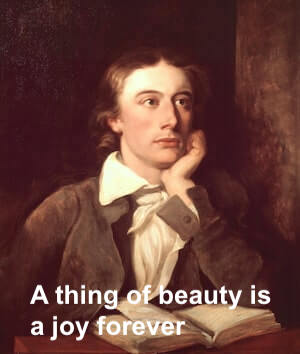A thing of beauty is a joy forever
What's the meaning of the phrase 'A thing of beauty is a joy forever'?
The experience of beauty is blissful and lasting.
What's the origin of the phrase 'A thing of beauty is a joy forever'?
 From
John Keats' epic poem, Endymion, 1818:
From
John Keats' epic poem, Endymion, 1818:
A thing of beauty is a joy for ever:
Its loveliness increases; it will never
Pass into nothingness; but still will keep
A bower quiet for us, and a sleep
Full of sweet dreams, and health, and quiet breathing.
Keats was writing just after the closing of the Age of Enlightenment where several British philosophers, notably Shaftesbury and Hume, had made a close study of beauty and aesthetics. Their generally accepted conclusion was that beauty was closely aligned to moral goodness and could only be fully appreciated by those of a moral and refined character. Keat's approach was more as a practitioner than a theoretician. He responded emotionally to beauty and saw it as available to anyone who had eyes to see.
That didn't stop other authors making fun of Keats later in the 1800s. By the end of the century Keats and the other romantic poets were often derided as being foppish and affected. In in comic novel Across the Chasm, 1885, Julia Magruder parodied Keats with:
'The mud-scraper', she wrote her mother, in her first letter home, 'is a thing of beauty, and the coal-scuttle a joy forever.'
See also, another of John Keat's well-known phrases - 'Here lies one whose name was writ in water'.
See also: the List of Proverbs.

